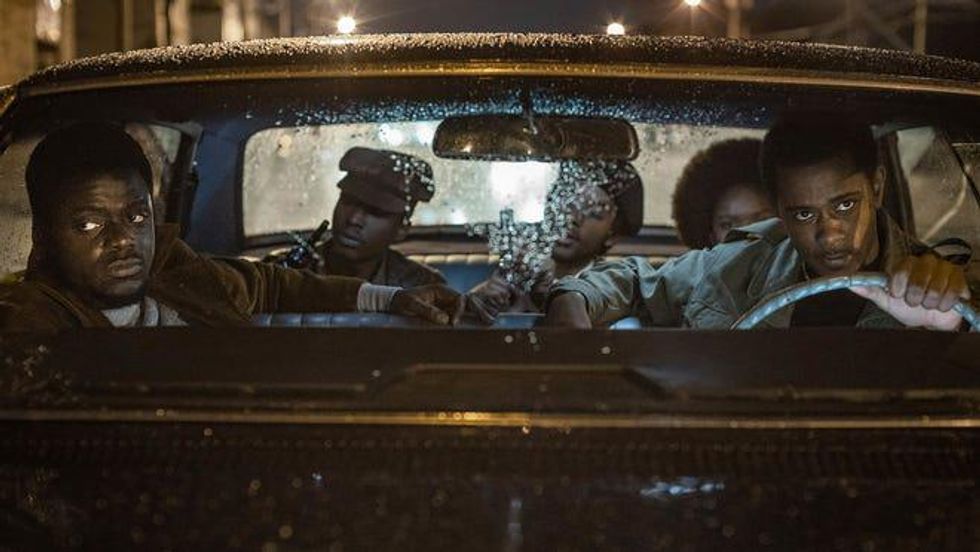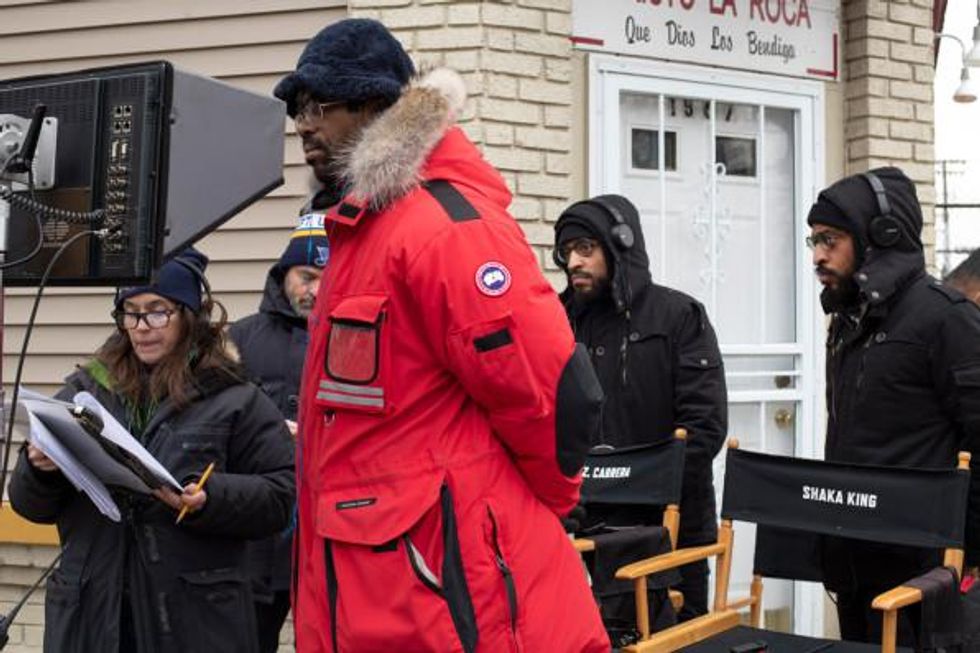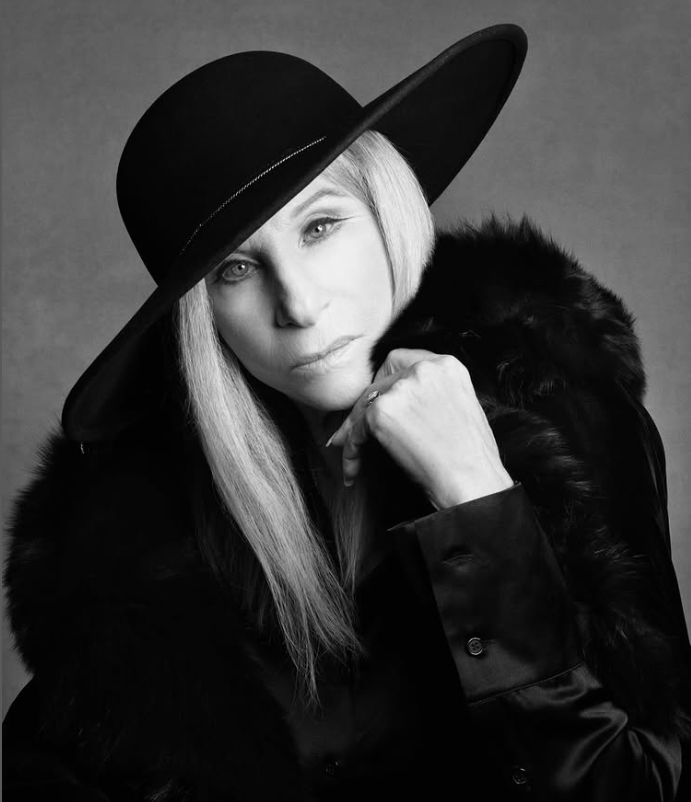Black History Month
INTERVIEW: The Lucas Bros Talk Writing “Judas and the Black Messiah”
12 Feb, 21

via Loshak PR
Judas and the Black Messiah has been 9 years in the making.
In 2012, Keith and Kenny Lucas, comedians, actors and writers, decided to make a movie about Fred Hampton. Hampton was the chairman of the Illinois chapter of the Black Panther Party and deputy chairman of the national Black Panther Party in the ’60s. Chairman was assassinated by the FBI’s counterintelligence program (known as COINTELPRO), which targeted Hampton and other Black radicals.
But despite the cinematic fodder of the era and the inspirational fervor of the Black Panthers, there are few prominent representations of the party in Hollywood. The Lucas brothers heard the story of Fred’s assassination in college and, as the Black Lives Matter movement was dawning in the wake of the murder of Trayvon Martin in 2012, were inspired by the spirit of revolution. Seeing parallels between the new BLM movement and the Panthers, they decided to get to work rendering the story of Fred Hampton.
JUDAS AND THE BLACK MESSIAH – Official Trailerwww.youtube.com
To go about telling the story, the twins did research on the Panthers and on Hampton. They found an interview from the 1987 documentary series, Eyes on the Prize, in 2013 and found footage of a man named Bill O’Neal — a Black FBI informant who had infiltrated Fred’s chapter of the Panthers and ultimately helped lead to his assassination.
The story of Bill O’Neal was an interesting one to the Lucas Brothers, who, as twins, are interested in duality. And so they began the journey of writing the film which would eventually be turned into a screenplay by Shaka King and Will Berson, then produced by Ryan Coogler in a production starring Daniel Kaluuya and LaKieth Stanfield.
But the journey was a long one. To hear them talk about it, the movie feels almost prescient — finding its genesis all those years ago at the beginning of the Black Lives Matter movement and coming out now, as even more conversation is being generated around BLM and the path to revolution.
The questions we have now, about choosing action in the time of unrest, are questions the Lucas Brothers were pondering when building the foundations of the story ofJudas and the Black Messiah. Above anything, it’s a film about choice — who we are and the choices we make and how finding balance between nihilism and optimism informs those choicePopdust: What’s it like being in entertainment right now?
Kenny: I think there’s a degree of optimism now that Biden’s president … but I also think there’s a lot of anxiety because we still want to work. We still want to produce content. But in order to do that, we have to put ourselves in situations where you could either get COVID or spread it. So I think there’s always that anxiety. But I think that by the summer, once we have a better understanding of where COVID is, you can crystallize our optimism, hopefully.
Balancing optimism and anxiety is a major theme of this film, balancing idealism and nihilism. How does that tension find new valence in this moment, especially in terms of the racial climate?
Keith: When you’re an African-American person in this country, there’s always two sides. There’s the hopeful side and then there’s the nihilistic side. For me, I waver between the two. When I was younger, I was way more hopeful and I thought things would change and there would be a lot of progress and racism wouldn’t be as pervasive and rampant as it is. But you keep seeing instances of diabolical racism and racist events that pushed me closer to nihilism. But we’re hopeful. We’ve been in this country for a very long time and we’ve gone through a lot of shit and the hope is what has helped us persevere. So I’m more inclined to push people to be more hopeful, but I totally understand why a lot of people are nervous.
Kenny: And that’s the thing about evidence and facts, they can be used to support either side. I think if you want to make the case that we should be optimistic, there is ample amount of evidence to support that claim. But there’s also an equal amount of evidence to support the claim that we have the right to be nihilistic about race relations. So I think it’s a matter of juggling those two seemingly contradictory thoughts.
The film is all about contradiction. You chose to focus on the other aspect of the Fred Hampton story — on Bill O’Neal, the FBI informant. What was the impetus and the vision behind choosing that side?
Kenny: We’d been doing quite a bit of research about COINTELPRO and the insidious nature of it and the lengths to which the FBI went to take down such a prominent and pivotal figure in our lives and the lives of many African-Americans. I think we wanted to put a face to that but give it some complexity and some nuance, because if you don’t add that aspect of it, I don’t think you’re telling Fred’s story in a complete fashion.
So I think it was important to understand how the FBI went about using their informants to ultimately assassinate Hampton. I think we wanted to see the entire process, or some part of the process that would generate further conversation.
Once you’ve started the conversation, created something and put it out into the world, it’s no longer in your hands. How do you balance telling a story that’s complex and nuanced and artistic, without it seeming politically prescriptive or irresponsible?
Kenny: I think the best way to tell this kind of story is to be as factual as possible. If you ground the story in fact, then you’re going to allow the audience to ultimately decide how they feel about this particular person. This is the beauty of stories: It can be framed in many different ways.
We could have told it from the perspective of Fred, we could have told it from the perspective of Roy Mitchell, we could have told it from the perspective of Jay Edgar Hoover; but, I think by telling it from the perspective of Bill, you add a duality where you get to see the tension of these oppositional forces at play visually. And you don’t want to underestimate the intelligence of the audience. I think they can draw their own conclusions.
When you choose how to tell the story of Fred Hampton, and you choose to tell it from this perspective, what do you hope that the art will do? Especially now, considering the kind of political climate that it’s entering into.
Keith: When we first came up with the idea, I think the hope was to start a conversation about how you’ve got Fred Hampton, who is committed to his beliefs, committed to his principles and who was willing to die for it; and then you have this other guy Bill O’Neal who is the antithesis of Fred Hampton.
So I think when we were coming out with the story we wanted to explore that duality. And almost as if we were framing the question: “Who would you be? Who would you be a Bill O’Neal or would you be a Fred Hampton?” And in growing times of unrest, now with the film coming out and with it being very well-received, we still hope that that’s the conversation that’s being had.
Like who you see yourself as in a time of growing unrest? Are you committed to the people? Or are you committed to capitalist principles? And Shaka and Will did a brilliant job in framing the issue around that.

And what was that working relationship like — from going to the initial idea to writing and working on the film and now seeing it realized?
Kenny: We all had a meeting of the minds. I think it was divine inspiration where we’re like, look, we know our rules. We have to do what’s best for the film in order to execute the story, in order so that we can get a quality film out there for Fred Hampton. So for us, the whole process was amazing, right?
Keith: Right. There were no egos. Everyone played to their strengths. And I think the whole collaborative effort and everyone who worked on the film played a role that was pivotal — from costumes to production and production design to cinematography and everyone involved. I think it’s in large part because they realized the gravity of Fred’s story and how significant he was. And I think that his spirit was running through the entire set from when we initially came up with the idea to when Shaka and Will wrote the screenplay to when Shaka was shooting the film. I think we got a lot of Fred’s spirit permeating throughout the whole creative process.
How do you guys see yourselves within the new vanguard of Black film?
Kenny: When a collective force of people are given a situation, an opportunity to tell stories about their particular culture, there’s a spot for so many different visions within that collective. We provide a unique perspective — being from Newark, being twins, being comedians with some dramatic chops. So I think we’re going to be a small part of a very large movement. And I’m ecstatic to see what happens in the next decade and what types of art come out of this movement, because I think it’s going to be groundbreaking.
Your other projects have different tones. What did you bring from those other projects into this creative process?
Kenny: Every endeavor, every project is very special to me. I think this is probably the most important from the standpoint of who we’re talking about and the story that we’re trying to tell and the stakes and the magnitude and its relationship to his family. The gravity of it is way more intense.
Keith: I’d say, we took from other projects the discipline that you need to see this through. You’ve got to prepare yourself for both the negative and positive. I think that previous projects have made us more — I wouldn’t say impervious to negative opinion, but more mentally prepared for it. And there’s always this degree of camaraderie and the collaborative spirit — especially when you’re working on something about a socialist revolutionary; you can’t help but be a little more Hegelian in your thought.
And what are you taking from this project into your next project?
Keith: Just being able to watch Ryan Coogler and Shaka and Charles spearhead this thing and push it and take it to the next level and be so relentless in making sure the story was accurately told, we’re taking that with us to our next project — making sure when you have a vision, you have to be bold in trying to see it through. And, of course, you’re going to have to deal with politics and studios and all that jazz. But just being committed and relentless.

And did the higher stakes of this film, from the story and the scale, give you more freedom? Or were you more cautious?
Keith: When we were developing the story, this was right around the time when Trayvon Martin had been murdered and Tamir Rice had been murdered. And Mike Brown. So this was the beginning phase of Black Lives Matter. And I don’t want to say we anticipated it; I think that there’s been a lot of Black tragedy throughout the decade. So it was already baked into the ethos of the story.
Being born in 1985…we’ve seen a lot of Black trauma. And I think when we were doing it and when BLM was starting to blossom, obviously you see the parallels and you’re like, holy sh*t, not much has changed from ’69 all the way up until now. Cops are murdering African-Americans with impunity.
But to see the movement of Black Lives Matter start to stand against it and fight against it was revelatory. And again, it was very reminiscent of the Panthers and how they stood up against police brutality. The conditions were already there, and we were sort of influenced by all of it and it manifested itself that way.
Yeah, when you get such a transcendent story like this one, it feels prescient, but it’s really historical and it’s also drawn from this tapestry of tragedy that we experience in this country. And it’s Black history, but the push and pull between idealism and realism — this community-focused approach versus a capital-focused approach — is very American.
Kenny: I don’t think you can get the Bill O’Neal/Fred story, the true story, [unless] it is a byproduct of living in this country where you have one guy who is completely anti-fascist and anti-capitalistic, and then you have another guy who is completely committed to the principles of capitalism, but they both exist in the same universe. That’s just American in and of itself.
I think we saw the story, but the story was already there. And we framed it, but we didn’t frame it. The universe framed it. And America plays a huge role. In these true stories, we have an opportunity to try to get them made to be on the big screen, but it’s a real story with real consequences. So I don’t think you can get a story like this outside of America, and we were fortunate enough to be the vessels to play a part in getting it made on the big screen, but this is a true story. It was made in America.
Has your perception of the audience changed from writing the story to now, with all the potential awards attention? Like, who are you speaking to and how do you kind of balance the need to tell a story to the widest audience possible and bring awareness to something, without compromising the reality and intimacy?
Keith: Right. Right. Yeah. It’s tricky, because when we were writing the story, obviously we didn’t have The Oscars in our mind. We were just like: What can we do to put this story in a position to be told so that message can spread? And Fred was anti-material, anti-capitalist, anti-awards.
So as I listen to his speeches over and over again, as I watch the movie over and over again; as I listen to the speeches that were written in the script, his message sticks with you and it stays in your head and it’s hard to even think about awards. But on another level, I know that there were a lot of people involved in this film that worked their asses off to make sure the story was told properly, from Shaka to Will to Charles King to Ryan Coogler to all of the actors and actresses.
Everybody involved put their heart and soul into it. So I would love for it to be acknowledged, and I would love for the folks who worked on the film to be acknowledged. But at the end of the day, that’s not the victory. I think the victory is being able to see Fred’s message and getting people who watch this movie to absorb his message.
What do you think are the most potent things that you’ve taken from immersing yourselves in Fred’s story and in the time period?
Keith: Before embarking on this journey, I had very limited information about Fred. I mean, I knew about the death, I knew about the fact that the FBI conspired to kill him. You hear a lot about the tragedy of Fred Hampton, but you don’t really hear about how Fred lived his life. Fred was a doer, and he did so much for his community. And I’m just thankful that some parts of his message are now going to be spread to a wider audience, because hopefully it can inspire people to want to serve the people and help the people.
I went into the filmmaking process very nihilistic and not very hopeful. But then from listening to Fred and hearing his message and just seeing how inspired he was to get up every morning and serve the people, that inspiration has certainly influenced me. And I think that influenced everyone involved on the project when we were on set.
I had never seen a group of people so committed to telling the story and never seen that type of camaraderie. Obviously, it was very traumatic and triggering and it was hard sometimes; it was a lot of tears. People were still so committed, and I think it’s in large part because of Fred’s spirit and the fact that he preached hopefulness, despite living in a situation that wasn’t always hopeful. So I just feel like I’m way more optimistic about life. And I definitely want to do more to serve people. And I think that this film will hopefully play a part in leading to a renaissance of Fred Hampton where people are just absorbing this message.
Kenny: I would say I’ve just grown as a person. When you immerse yourself into Fred’s orbit and you’re listening to speeches and you see what he did at such a young age to change things, you can’t help but be moved by it. And I hope that I’ve become a better person as a result of telling this story.
I’m less ego-driven, less committed to my own enrichment, and I’m thinking about how I can help people through my storytelling or through my comedy. Whatever artistic endeavor I do, I always want to have a social aspect to it. That said, I don’t want that to ever get lost. And I think Fred allows for me to see that there are more important things in life than material things. And I think that getting this story done is probably one of the greatest things I’ve ever done. I’m just proud to see it through.













